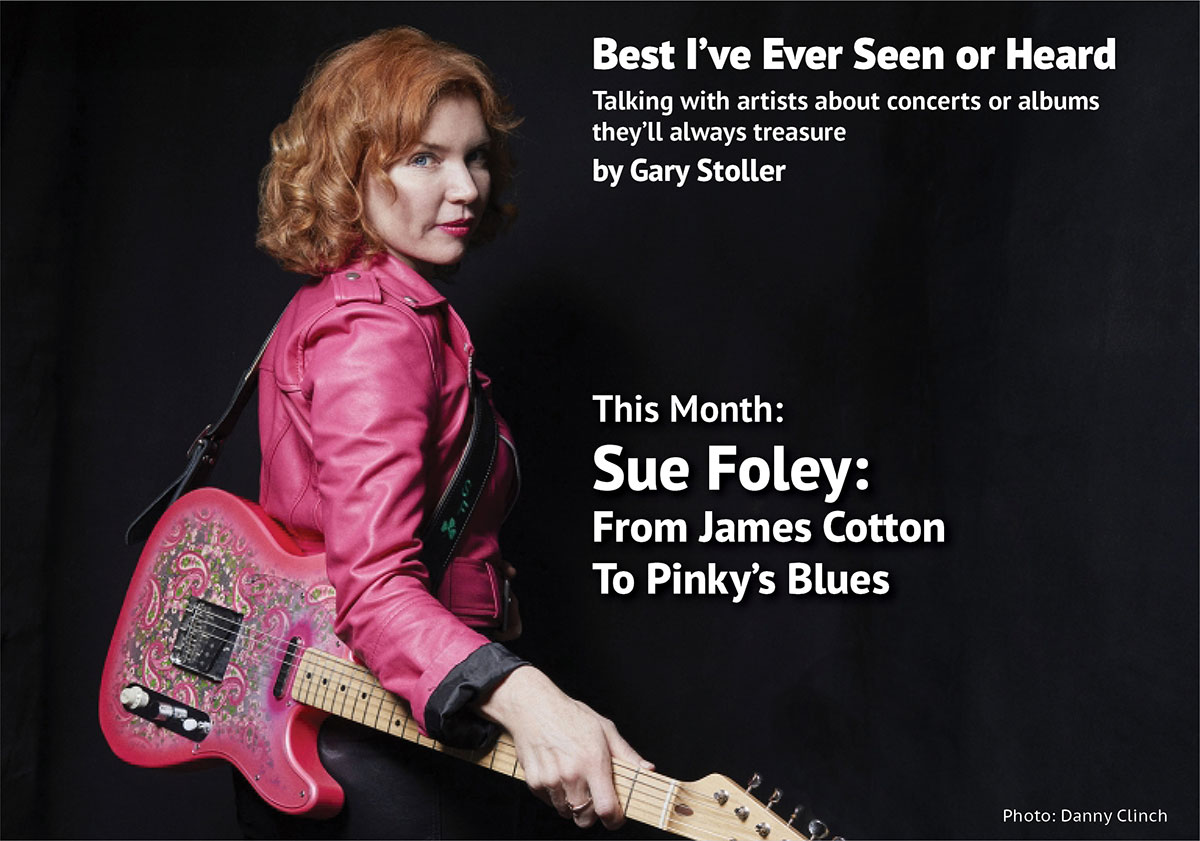
Unlike her award-winning 2018 album, The Ice Queen, Sue Foley aimed to keep her new album, Pinky’s Blues, very simple.
“There were only five people in the studio, and it was intimate and live,” the blues guitar slinger tells me. “The Ice Queen had a lot of special guests and different band formations and featured some acoustic songs. This new album is an electric blues guitar album. It’s something I can pull off live easily and a much simpler production than The Ice Queen, which is almost a concept album. Pinky’s Blues is more akin to the blues albums we grew up with, when everyone just played together in one room, very close to a live performance.”
Foley recorded Pinky’s Blues during three days in late fall last year.
”Pinky is my pink paisley Fender Telecaster that I’ve had for more than 30 years,” she says. “I got her brand new that long ago and have played her on every album and at almost every show over the last decades. She’s what you hear on this album. This is a blues guitar album that Pinky can just rip on.”
The pandemic caused Foley to wait to release the album until she could start touring again. She resumed playing live in late May in Austin and played 21 more shows in Texas, Illinois, Tennessee and Switzerland through November. She hits the road again Dec. 3 in Kansas City, Missouri, and then is scheduled to play numerous shows in many states and Canada through April 2022.
The album includes several cover songs.
”We handpicked several cover songs, including ‘Say It’s Not So’ and ‘Two Bit Texas Town,’ from one of my favorite blues singers Angela Strehli; ‘Stop These Teardrops’ from the great Lavelle White; ‘Boogie Real Low,’ a Frankie Lee Sims song, and a Clarence ‘Gatemouth’ Brown masterpiece ‘Okie Dokie Stomp.’ They are just songs I’ve always loved and wanted to try and record. It was all just for fun and the love of it. This is a passion project in a way, a tip of the hat to my heroes and the music that’s helped make me who I am as a player.”

The heroes are legion. I ask Foley to sort through them, then name the best guitarists she has heard and explain why she considers them the best.
“There are almost too many to mention,” she responds. “My favorite guitarist has always been Earl Hooker. He’s one of the unsung guys out of Chicago who was so creative and had amazing phrasing and musicality. He could play any style of music. I guess that’s what I also love about Clarence ‘Gatemouth’ Brown. He was such a skilled musician and such a badass guitar player. He was wickedly fast and played everything: blues, country, Cajun, Big Band — you name it. I also adore Jimmie Vaughan and Billy F Gibbons who I’ve had the pleasure of playing alongside. Every night is a guitar lesson when I’m playing with those cats.”
Foley says it’s impossible to name her three favorite albums. She names some of her favorites.
“I love The Best of Muddy Waters on Chess Records. You also can’t go wrong with Willie Dixon’s The Chess Box Set. There are way too many. Anything by Memphis Minnie, Earl Hooker, Robert Nighthawk and Bessie Smith.”
Foley says it’s also difficult to name the best concert she attended, because she has seen many great ones.
“I always loved seeing Etta James sing,” Foley says. “She was by far my favorite female performer. She was just so powerful and so deep. She had such humanity, and she gave so much to the audience. She was bawdy and funny in one moment, and you’d be laughing with her, then the next moment, she’d tear your heart out and you’d find yourself crying. I was just blown away by her ability to bring the audience with her to these intensely private places and share her heart and her truth the way she did. I really cherish the times I got to see her live.”
The concert that most influenced Foley was a James Cotton show when she was 15.
“We snuck into the club to see him and his band who had come up from Chicago,” Foley recalls. “They burned it up that night. I had never seen live blues before, and it changed my life. My feet didn’t touch the ground for weeks after that night, and I realized how much power this music has. A lot of people think the blues is sad music, but I was so uplifted. I was so changed that I made a pact to try and carry that message forward. That moment dictated the direction of my life.”
